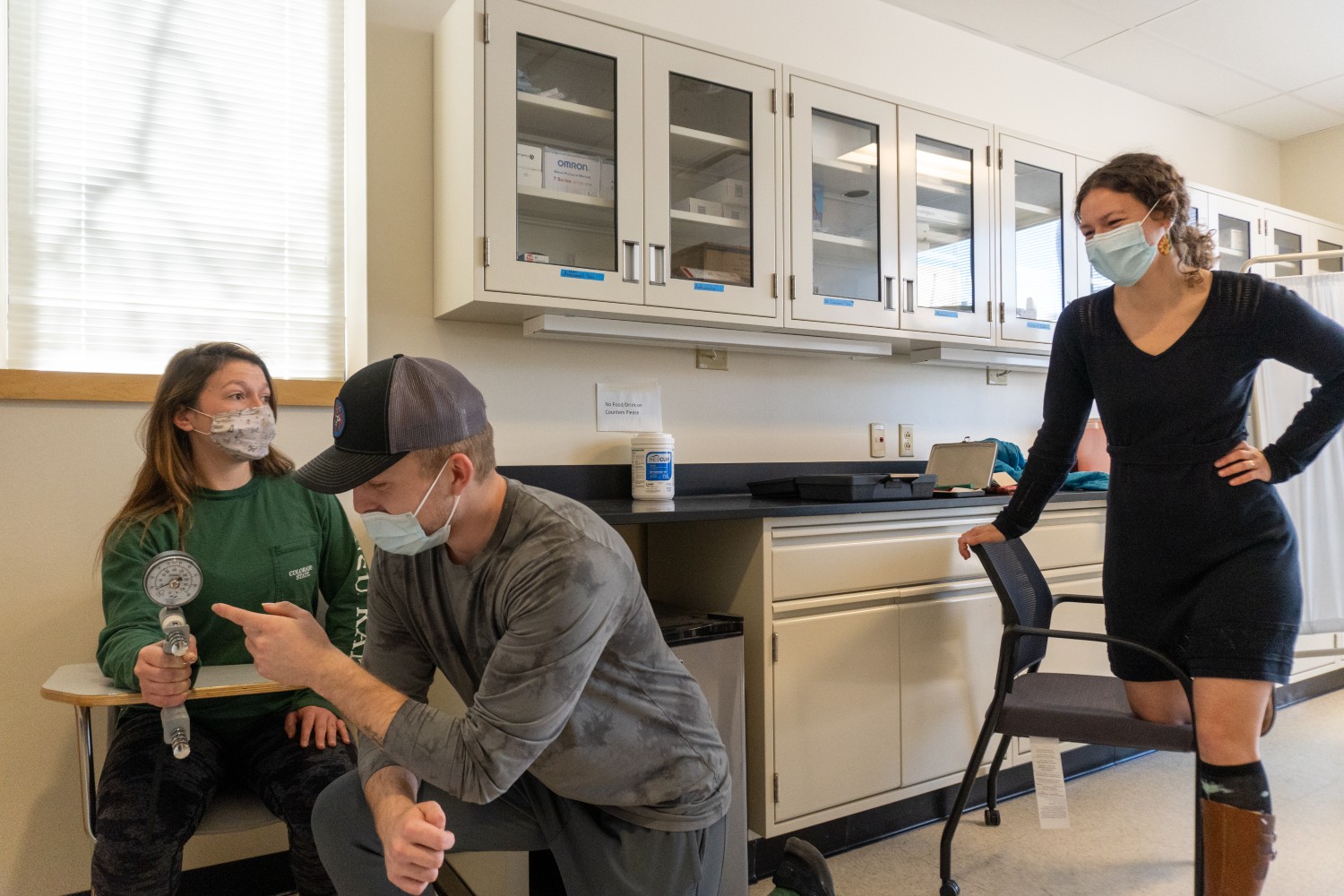
In 2012, Pat McKlem (’70) made a significant investment in the Colorado State University Department of Food Science and Human Nutrition. With her gift, the Pat McKlem Medical Nutrition Therapy Laboratory was born, and she has continued to support the lab in the years since then.
Over the last decade, the lab has become a teaching and research facility that provides undergraduate and graduate nutrition students with true-to-life, experiential learning opportunities. To date, more than 250 students have utilized the lab and have garnered the practical and technical skills they need to excel as professionals in the field of clinical dietetics.
Inspiration to attend CSU
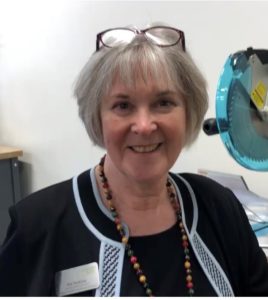
While growing up in Pueblo, Colorado, in the 1950s and 60s, McKlem knew about CSU and the opportunities that college could create. But when it was time for high school and future career aspirations, McKlem assumed she would stay in Pueblo and pursue a secretarial job. During her sophomore year of high school, she took a home economics class that changed the trajectory of her life. The class included a guest speaker – a U.S. Air Force dietitian. The speaker inspired McKlem so that she abandoned the secretary plan altogether and set her sights on attending CSU.
In 1966, McKlem left Pueblo and headed up to Fort Collins where she enrolled at CSU to pursue a degree in home economics with a concentration in food science and nutrition. McKlem enjoyed the courses and she appreciated how well-rounded the curriculum was. She fondly remembers an instrumental mentor and professor, Margaret B. Hazaleus.
Hazaleus was the assistant dean of the then College of Home Economics (now known as the College of Health and Human Sciences). Hazaleus helped students map out career dreams and aspirations. McKlem remembers a letter-writing exercise that Hazaleus had her students complete in a Senior Seminar. She instructed them to write a letter to their future selves – 10 years down the line. One decade later, Hazaleus mailed students the letters so they could see if dreams aligned with reality.
Career as a leader
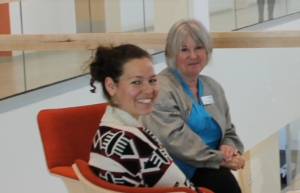
McKlem remembers the letter she wrote vividly, but her expectations did not match her career path as she had no idea she would go on to have an extensive career in dietetics and hospital administration. From that letter exercise, McKlem shared one important takeaway: “You never know what possibilities will be in front of you in five or 10 years so be open-minded about the future and all of the possibilities that lie within it.”
After receiving her undergraduate degree in 1970, McKlem completed a dietetic internship at the University of Kentucky Medical Center and the VA Hospital in Lexington, KY This experience kicked off a successful 35-year career with the Veterans Health Administration. McKlem started out in dietetics, then moved into management.
Along the way, she said “yes” to every exciting opportunity that presented itself and became COO and CEO of hospitals and later hospital groups within the VA. During her tenure, McKlem held various roles including chief of dietetic service, medical center director, health care systems director, and network director.
Grateful for CSU education
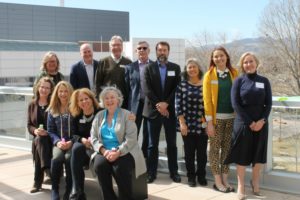
McKlem is endlessly grateful for her educational roots at CSU and the career opportunities that unfolded in her life since graduation.
“CSU is a critical part of my foundation,” she said. “However, my success did not hinge on my degree alone. Yes, a degree is a helpful tool, but the biggest benefit of higher education is that it allows people to explore new areas of interest and because of that, you learn more about yourself and what you will enjoy doing with your life.” She continued, “You will be successful in your career (and in your life!) when you know yourself and know your talents.”
Since leaving Fort Collins in 1970, McKlem has felt compelled to give back to the university that gave her such a great launching pad. Starting in 1982, she began making small annual gifts to support the Department of Food Science and Human Nutrition. After 30 years of giving, she decided she was at a stage in life when she could “do more.”
Launching the lab
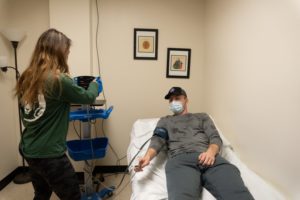
In 2012, she joined the Executive Leadership Council for the College of Health and Human Sciences and got re-acquainted with the Division of University Advancement as well as the department head for Food Science and Human Nutrition at the time, Chris Melby, and his successor Mike Pagliassotti. From there, McKlem started asking critical questions such as “What are the department’s biggest needs right now? Where are there gaps and how can I fill those?” As the conversations evolved, the idea for a new Medical Nutrition Therapy Lab was fleshed out.
Thanks to McKlem’s generosity, the Pat McKlem Medical Nutrition Therapy Laboratory opened its doors in 2014. In the FSHN 450 Medical Nutrition Therapy course and accompanying lab, students learn about nutrition therapy and the treatment of acute conditions and chronic disease states.
Over the last decade, McKlem has come back to campus often and she enjoys seeing the lab in action. She explained, “The MNT lab provides a foundation for nutrition students by giving them the space to practice clinical skills and innovative research, which all contribute to better clinical care in the future and help to improve the field of medical nutrition therapy.”
Melby, who is again serving in a leadership role as the interim department head for Food Science and Human Nutrition said, “Our nutrition and dietetics students have greatly benefitted from Pat’s generosity in establishing the medical nutrition therapy laboratory. Just as important as her financial generosity, however, is her wisdom, born from her many years of experience as a health care leader, which she readily shares with our faculty and students, and her legacy that serves to challenge and inspire us all. She is a valued colleague, and we treasure her friendship and ongoing engagement with FSHN and CSU.”
Impact on students
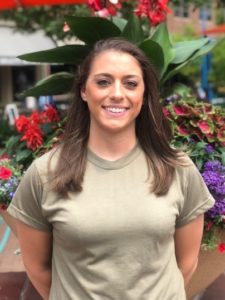
“The Pat McKlem Medical Nutrition Therapy Laboratory is paramount to providing our future nutrition professionals with the practical experience they need to be successful in their careers,” said Brittney Sly, the current instructor for the Medical Nutrition Therapy course.
“The lab provides students with the ability to learn and apply nutrition assessment techniques,” said Sly. “Without the MNT Lab, our students would be restricted to a ‘paper practice.’ The hands-on experiences help our students develop their skills and clinical judgment. It is such an asset to the FSHN Department and all the future dieticians that we are training.”
Hannah Hockley, a recent graduate of the nutrition program, shared her experience with the lab: “The Pat McKlem Medical Nutrition Therapy Laboratory gave me an understanding of a day in the life of a patient with diabetes or dysphagia through hands-on learning and understanding what these patients go through.”
Since leaving CSU, Hockley has gone on to Vanderbilt University Medical Center where she is a dietetic intern. After her internship, she has the goal to become a research dietician.
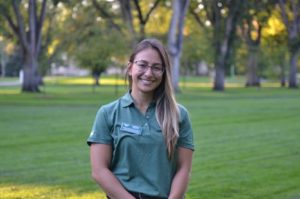
Gabriela Arikita graduated from the nutrition program in May of 2021. She reflected on her experiences in the MNT lab. She explained, “As a student who has always been intrigued and fascinated by science and the human body, I learned that you cannot separate nutrition from other sciences as all of them are integrated to maintain balance. By participating in the MNT lab, I was able to consolidate the information learned in class. Not to mention that I had a lot of fun formulating a diet based on different nutrition conditions!”
Right now, Arikita is currently working as a full-time Medical Assistant at a dermatology clinic and she is studying for the MCAT. She plans to apply to medical school this upcoming cycle.
Continued support
McKlem has been so pleased with her initial investment in and partnership with Food Science and Human Nutrition, that she continues to make annual gifts to support and enhance her named lab. Last year alone, she gave a generous gift from her IRA, which allowed the department to purchase a new Bod Pod Machine. A Bod Pod is considered by many to be the “gold standard” for fast, accurate, and safe body composition analyses in adults and children.
“It has been such a joy to see how innovative the department is in keeping this lab cutting edge. This environment and the equipment encourage new projects that make this lab home to new ground-breaking research,” said McKlem.
As McKlem thinks back on her robust career with VA and her ability to become a major donor to her alma mater, she shared some pearls of wisdom for students: “Don’t shy away from opportunities that scare you. Instead of saying, ‘I am not ready for that or ‘I am not qualified enough’ learn to say ‘Yes’ or ‘Yes if you’ll help me.’” She went on to say, “Always remember you are smarter and more talented than you think you are. So take risks and make some mistakes…but learn from those mistakes because each mistake will give you a new perspective and life lesson.”
The Department of Food Science and Human Nutrition is part of CSU’s College of Health and Human Sciences.